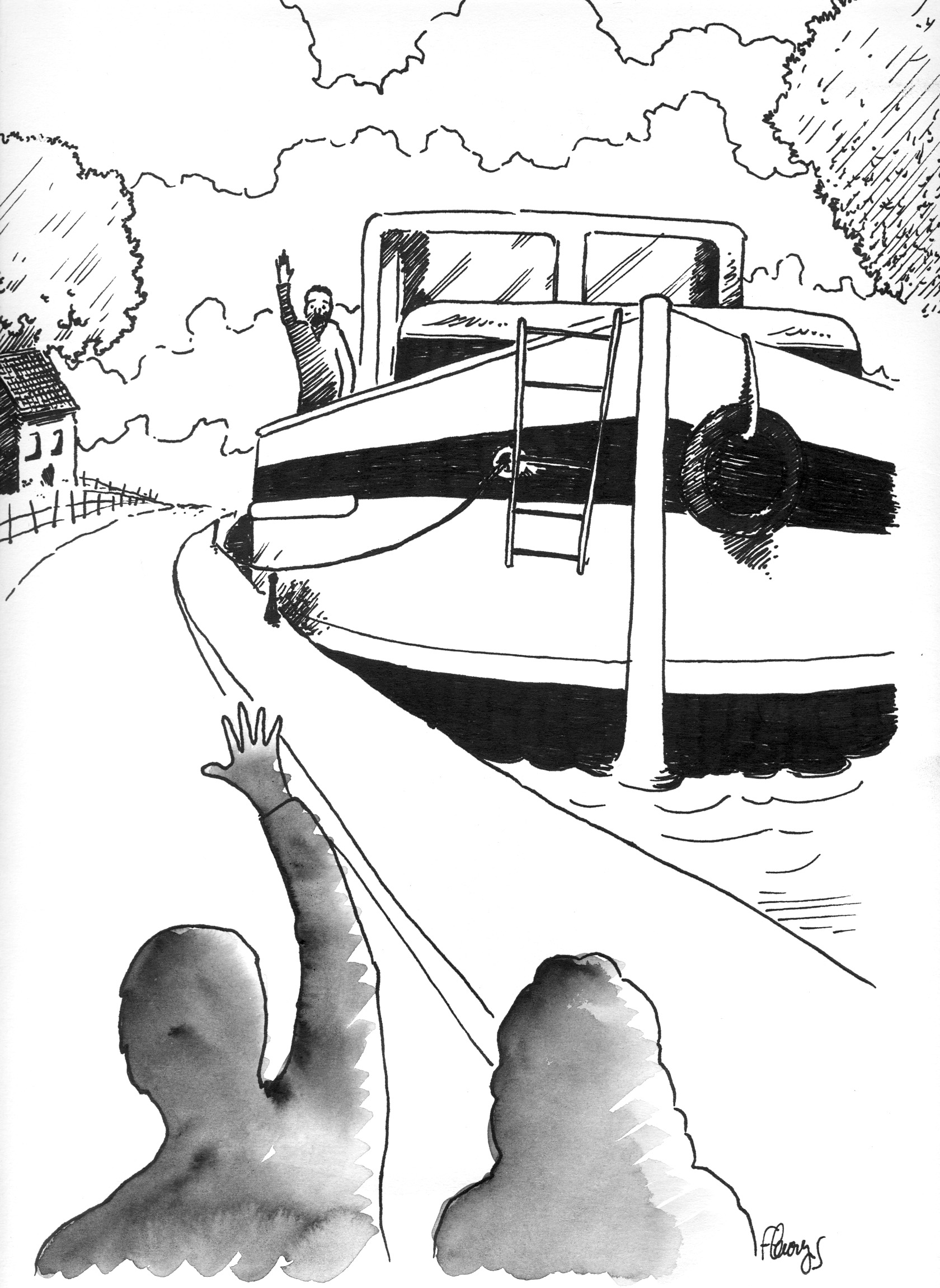
Publish in Ecorev’ n°41.
Yesterday’s utopia has become today’s reality!
Every year, at the onset of autumn, we are on our barge. It is time to anchor it until the end of winter and we have become used to do everything together: Vincent, Stéphane, Christophe, Anne-Isabelle, myself, and a few others. At a snail pace, we sail up the river up to the canal Saint Martin, up to the sources.
This year, the moment takes on a special importance. Away from the many celebrations organised throughout Europe, the many dance evenings, carnivals and cycling races taking place in every city, village, suburb and courtyard, we have opted to celebrate the ten years we have devoted to the instauration of an Unconditional Autonomy Allowance as an inalienable human right, simply in the spirit of our hallmarks: conviviality and sobriety. Thirty-seven years ago, Utopia Editions published « Un Projet de Décroissance » (A Degrowth Project: Manifesto for an Unconditional Autonomy Allowance). It was just a project. For some it was simply a liberal-libertarian foible or petty bourgeois in search of media exposure. For the apostles of Growth, it was a heresy. All agreed that it was simply a Utopia.
The manifesto was our horizon, our key driver and our benchmark. We had debated it at length, not solely as a tool of political appropriation, first outside the Parti Pour La Décroissance (PPLD – Degrowth Party) then within it. Consensus broadened with our partners from the Left, convergence’s scope became international. Quickly we were overwhelmed. Stupefied, we witnessed the birth of a new world… with its clashes and violences… reflecting upon it, it has been a long journey.
Vincent is pouring a Unicum (a Hungarian herbal bitter drink). We savour this rare drink that has travelled on bike and by train from the Magyar regions. But the occasion is worth it. Anne Isabelle has brought some goat cheese from a farm in the French department of the Yvelines. The reunion begins under the best auspices and the day is still young.
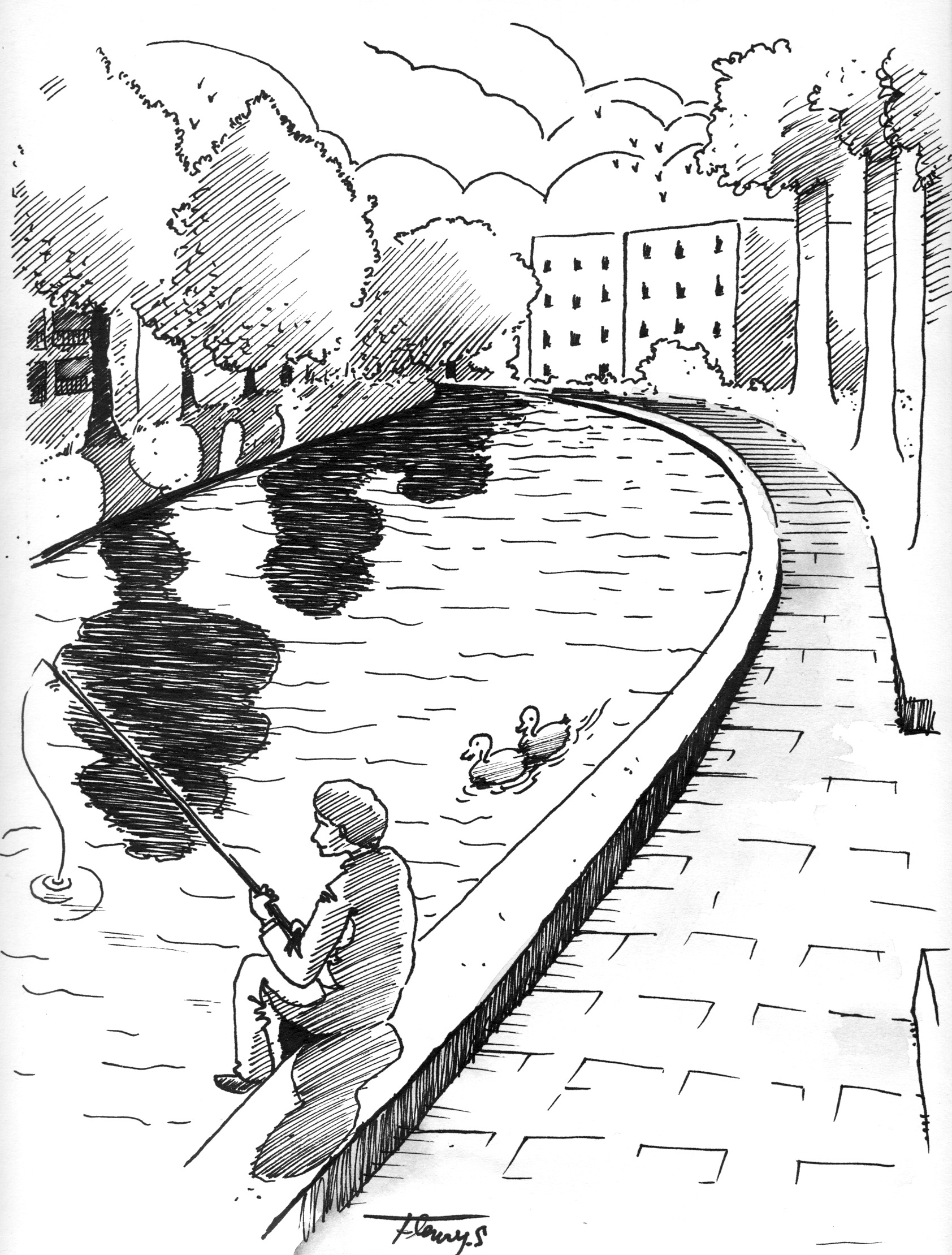 Personally, I did not believe in it. The benchmark was too high, the abyss too deep. Even during the short period as the PPLD’s national secretary, I remained convinced that it was a lost cause, that Barbary would triumph. But I still kept going with friends, militating, debating, writing, and doubting. But also I experimented, re-appropriating know-hows, freedom, conviviality and autonomy spaces. The only thing we had left was hope or being resigned to violence, fear and isolation. We were sowing seeds, hoping that one day they would germinate.
Personally, I did not believe in it. The benchmark was too high, the abyss too deep. Even during the short period as the PPLD’s national secretary, I remained convinced that it was a lost cause, that Barbary would triumph. But I still kept going with friends, militating, debating, writing, and doubting. But also I experimented, re-appropriating know-hows, freedom, conviviality and autonomy spaces. The only thing we had left was hope or being resigned to violence, fear and isolation. We were sowing seeds, hoping that one day they would germinate.
In 2013 we argued that transition was underway. I thought it was crawling at agonizingly slow pace, but I was wrong. It was going at full speed. Then, the world was brutal, egoist, unfair, unbearable; now it is nothing but a research object, a story I tell my grand children during winter evenings.
The journey has been violent sometimes and it has not always followed the pathways we had anticipated. The schism was real. The critical mass took a long time to eventuate. But when we give people something to see, to dream about and to love and they start to see, to dream and to like this project, before it even exists, it can only but work. From all fronts utopia was making headway.
To start with, a maximum income threshold, voted immediately after the mid 2010 violent events, was implemented in the Northern countries, followed by the law on the 30 hours work per week, then 25 hours and 20 hours.
Then, after the oligarchy had attempted to reclaim power in the early 2020s, the basic income was implemented in all European countries, thanks to the democratic re-appropriation of the European Central Bank and the monetary creation.
At the same time, in Southern Europe devastated by ultra liberalism and its austerity plans since 2008, dozens, hundreds, thousands of concrete alternatives sprouted: the re-appropriation of private property, a ban on intensive agriculture, free proximity public transports, the incremental taxation of electricity consumption, community gardens, alternative markets and local currencies, the end of car only, classes in non-violent communication…
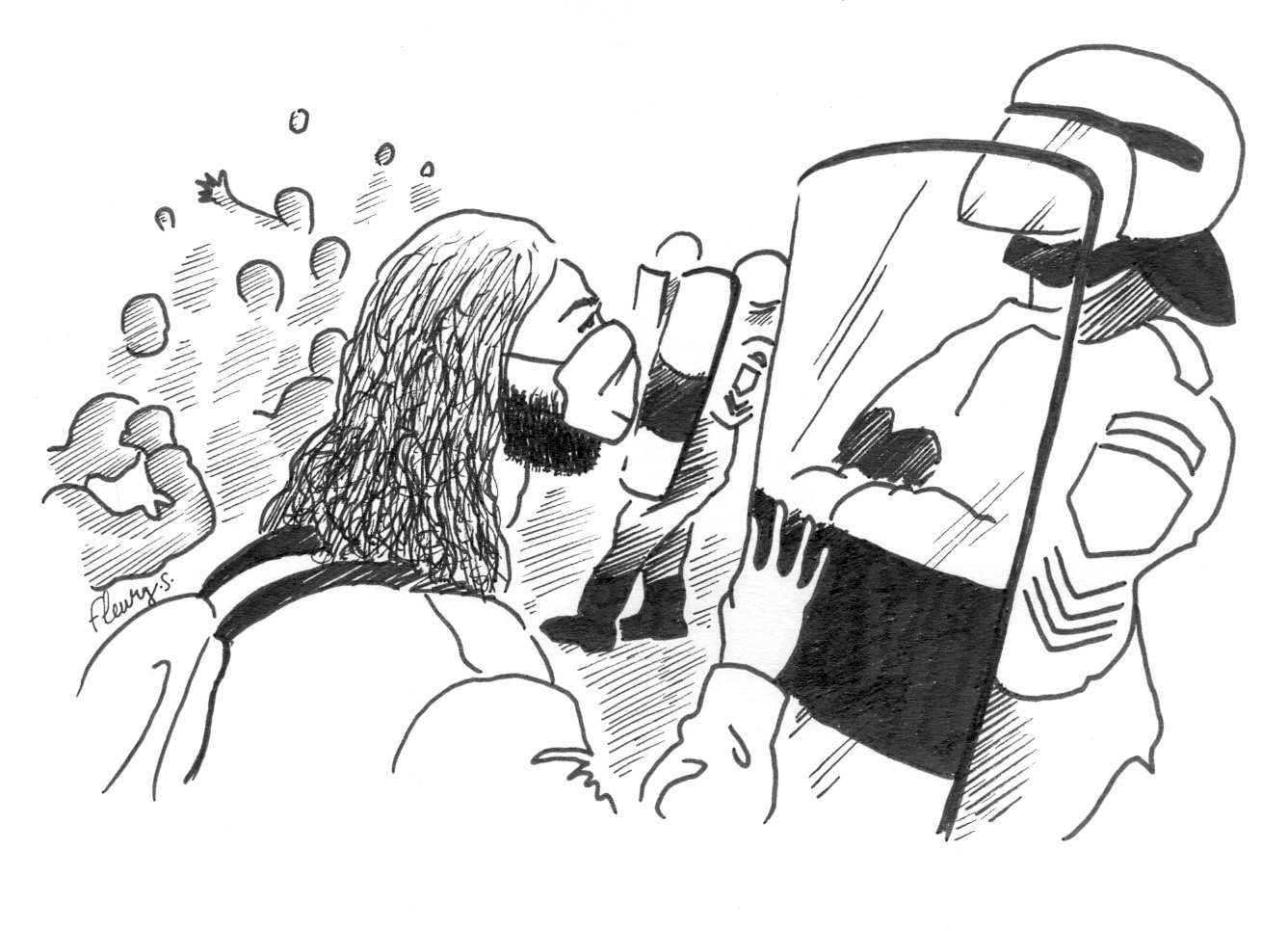 Based on the dynamic of these practical alternatives and on a culture of non-violence, all these decisions have deeply changed our societies and have put a stop to productivism and insecurity. “The re-politicisation of society and the re-socialisation of politics” as we said in those days, came into light!
Based on the dynamic of these practical alternatives and on a culture of non-violence, all these decisions have deeply changed our societies and have put a stop to productivism and insecurity. “The re-politicisation of society and the re-socialisation of politics” as we said in those days, came into light!
Bottom up and top down, from North to South, we made it.
With the fifth bottle, we lose track of our ages. Friends laugh when we mention Beaugency and the platform for convergence. Some wounds have not healed, but the occasion is a light-hearted one. After all, we meet only once a year. To travel the hundreds of kilometres separating us the rest of the year, is no longer so easy (but the means of transport are far more convivial, offering a different relation to time and people …) and virtual relations have been reduced to next to nothing since the global melt down.
We have plenty of time on our hands. I never enjoyed the privilege to “retire”, but I have had the chance not to have to work. During the last thirty years, I only did two things: the necessary tasks for the community (collect garbage – it was my duty yesterday!) and whatever I fancied. Everyday we wear many hats: workman, artisan, intellectual, contemplative, artist, convivial, politician, festive… No one is condemned to hard work any more, except from the few politicians remaining politicians. The very people I did not imagine in 2013 have given in to common sense and implemented an Unconditional Autonomy Allowance.
Gone are the minimum social benefits, the immoral income discrepancies and the golden parachutes. Gone are the interest rates and commercial banks, gone are the share dealers, shareholders, hedge funds and other economics nonsenses. From birth to death, everyone receives his/her share of wealth, just for being a society member.
Every month, a small amount of local currency is deposited in everyone’s purse. Water, electricity and gas meters are reset to zero, after the cubic meters and kilowatts over the allocated amount according to the composition of the family, have been billed. Some barter and give-away markets set up shop on public places for a few days, so that every one can choose what he/she needs or give away unwanted goods. It’s a paradise for collectors and nostalgic ultra-liberals in search of flat screen TVs, smartphones, early 2000s’ economics manuals, or microwave ovens. The rest of the time, we can visit friendly recycling centres with their many volunteers offering furniture, bicycles and know-hows shared as simple “hellos”.
Each month on the first Sunday, people register for communal tasks for a few hours per week. Those who chose full time employment to earn up to the Maximum Income Allowed – that is four times the UAA – are exempt. Children too, since they are busy learning basic skills in non-violent communication, entropy, permaculture and arts.
With the end of oil most of the tertiary jobs have disappeared: a return to farming, manufacturing and reason has been necessary. It has not been difficult: the shock was cushioned by the UAA and people did not lose their jobs bleeding and crying. They did not lose much income. The only lost their chains. Most were happy to leave their workplaces: silently, they were just waiting for the opportunity to do it. They opted for a fulfilling activity of their choice. Instead of spending time in open space to pay the nursing home or childcare centre rent, each has been able to reconnect with family members, look after their parents, children or handicapped family members. The population has not increased much since 2013. Junk food, stress and pollution have reduced our life expectancy and we might be the last generation to reach 80 Y.O. Even if the life expectancy indicator has remained the same over the last few years, it augurs well for the future. Every one is happy and healthy, smiling, free from worries and endemic stress, equal and respectful of the other. No one needs to worry about his/her own funerals since they will be taken care of by the community. Now we accept death, freed from the illusion of immortality, unconsciously nurtured by the Growth society. At the other end of the spectrum, children have re-learnt to get bored and use their imagination, kick the remnants of leather balls and play cards whilst talking about the old Euro notes. Hardly any cash is left in circulation.
The main impediment to the Unconditional Autonomy Allowance, the main objection we have had to answer: that is it’s financing, disappeared at the same time the stock market and the banks did. Capitalism, in front of a wall, didn’t show that much resilience after all. Since no one is left to make profit on production, to speculate on real estate, the need to give a commercial value to every single thing has disappeared. Use value has taken the central place.
The night is falling. Stéphane has once more joined us with his favourite records. Sometimes I regret the music made with electric instruments. We have kept many technologies from the last 40 years. But we have had to come to our senses and get rid of gadgets and whims. And the trend favours coolness, strolling, universal practice and acoustic bands are best suited for it.
Nowadays we produce only the necessities. No more, no less. We are enjoying a frugal abundance. Every one has enough to eat, drink, live at, have a good time, and, since the requisition law, a roof over their head; the first square meters of which are taken care of by the community and maintained by all. We have entered the post-extraction and post consumption era. Of course, none of this would have been possible without the creation of a real democracy. Evidence and necessity appeared concurrently, all the inhabitants, freely informed in a cooperative and balanced manner, make the decisions at the local level. Common sense, local reality and consensus have replaced the republic of the experts.
Thus, my monthly water usage right, in my intergenerational building on the Normandy coast, is quite different form Christophe who took refuge in the Massif Central with its arid summers. Politics is no longer an off-putting word: it is at the heart of the social fabric. Paradoxically, we have had to wait for the implementation of our project to discover what “being in business” meant. We have never sought to access power; we were not gifted for that anyway. As soon as it became a matter of taking responsibility at the local level, we fronted up. I even enjoyed it. I know this does not apply to all, and we are still talking about it whilst the moon is shining majestically. I keep reminding them how much these exchanges, debates, meetings, occasional failures have enriched me beyond my wildest expectations.
Unfortunately much remains to be done. Nature is reclaiming its rights but the megamachine has left us with a heavy inheritance: the dismantling of nuclear plants, the clean up of industrial plants, the worldwide interdependences: mainly oil based ones that we also have to dismantle as well as the detoxification of the soils depleted by intensive agriculture…
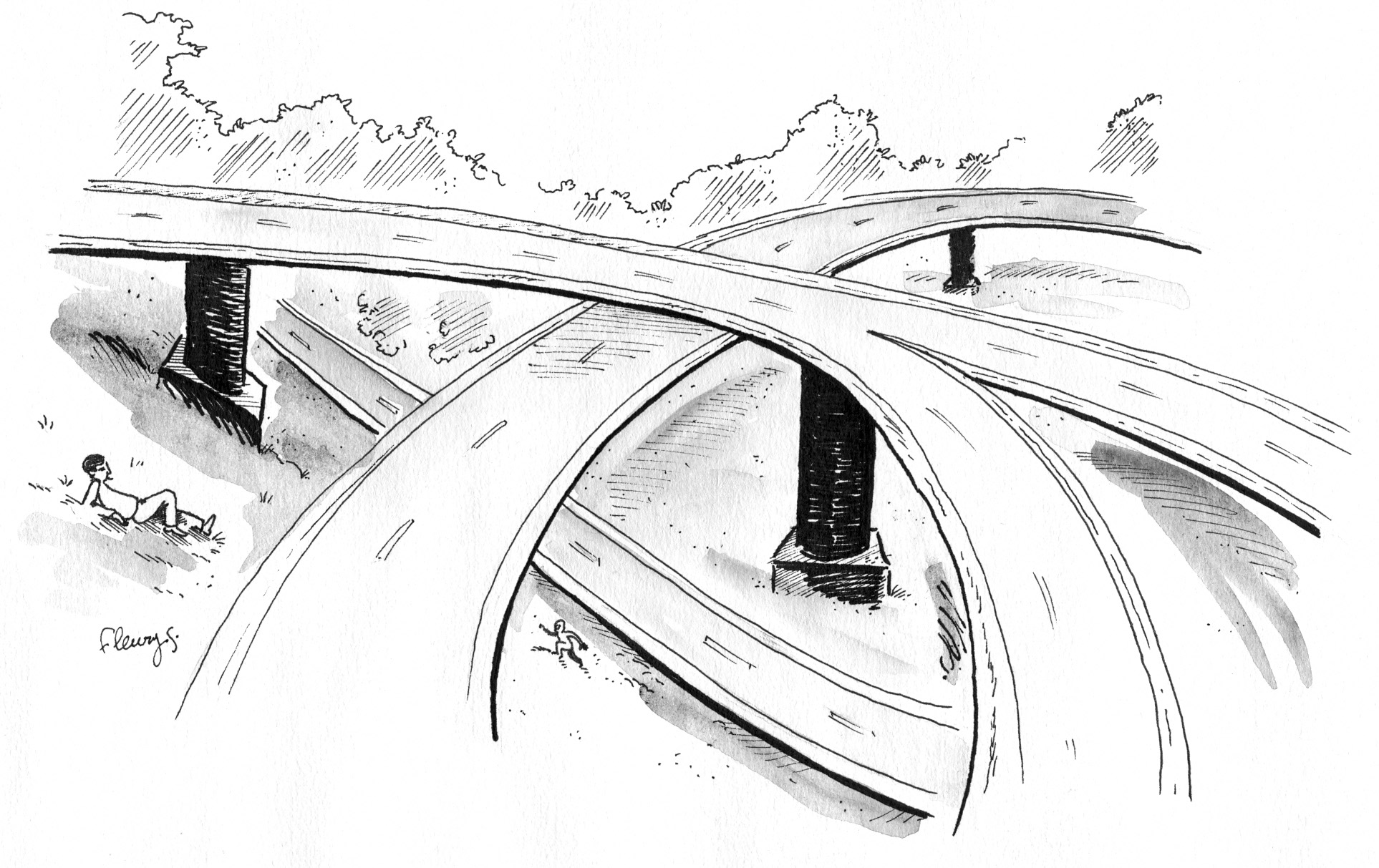 Nowadays, we guide our children through the vestiges of the techno-structure. The European Parliament has become an example of the self-serving technocracy. We visit airports. We wander around the last surviving highway interchanges… cities, as we have known them, have disappeared. Gone are the ads, concrete, artificial soils and cars. It is the era of agro-ecology, agroforestry, and convivial spaces!
Nowadays, we guide our children through the vestiges of the techno-structure. The European Parliament has become an example of the self-serving technocracy. We visit airports. We wander around the last surviving highway interchanges… cities, as we have known them, have disappeared. Gone are the ads, concrete, artificial soils and cars. It is the era of agro-ecology, agroforestry, and convivial spaces!
Pacified and improved human relationships between men and women and between past dominated and dominants, have made democracy possible. Patriarchy is still resisting in some population pockets but not for much longer. North-South relations have been reconfigured since we stoped exploiting lands and people.
Early morning we reach the food belt that has replaced most of Paris ring road, along the old Saint Cloud gate. The city is still gently animated, people laugh, dance, kiss, drink, and greet us. They are celebrating our collective achievements. We have made it together. We no longer had time to complain, we had no more time to criticise. We had to act and it has been exhausting. Forty years went so fast, everything went very fast. And it is not over. The UAA is not the end of the road. So much more remains to do and invent. I know that my daughter’ and her children’ future will be exiting.
“I never believed in it”, I concluded at sunset. All of this was unfolding in front of my eyes, here and elsewhere, discreetly or under the spotlights, but I could not see it. Even though I was convinced, I feared seeing it put in practice. The psychological barrier was the last to go and the hardest to bring down. My benchmarks had to go, one by one, the world I grew up in was changing in front of my eyes, thanks to or in spite of me, and I still did not want to believe it. It is a lot to ask from a man who sees all the bases of his education crumbling down, without knowing if he will come out of it happier.
It thought it was impossible. I must have been the only one. Since the tide was unstoppable. Thirty-seven years later, yesterday’s utopia has become today’s reality.
Thomas Avenel with Anisabel Veillot, Christophe Ondet, Cynthia Petei Sapiri, Stéphane Madelaine and Vincent Liegey from the collective collective « A Degrowth Project »
contact@projet-decroissance.net
A Degrowth Project – Manifesto for an Unconditional Autonomy Allowance, Utopia. Vincent Liegey, Stéphane Madelaine, Christophe Ondet Anne-Isabelle Veillot.
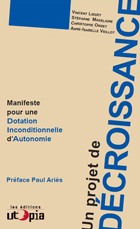 “ […] the prerequisite for the transfromation of the economy is “ a strong adhesion from all and a participation to this desire for change”. That is the least … But we have to start somewhere and this stimulating book contributes to it undoubtedly”. Hervé Kempf in Le Monde.
“ […] the prerequisite for the transfromation of the economy is “ a strong adhesion from all and a participation to this desire for change”. That is the least … But we have to start somewhere and this stimulating book contributes to it undoubtedly”. Hervé Kempf in Le Monde.
“ And the success of the book may suggest that “transition is well underway”. Emmanuel Daniel in Slate.fr.
And also:
- « A Degrowth Project » in Libération: Vincent Liegey : “We can no longer grow in a finite world”
- « A Degrowth Project » in « Le Monde »
- A Degrowth Project on Slate.fr: « To do away with the God of Growth »
- The transition is underway! – In Reporterre.net
- Vincent Liegey : “The freedom to consume is a costly illusion” – A Degrowth Project in Bastamag.
- A Maximum Acceptable Income: beyond the symbolic limits
- A springboard for a Degrowth Project: the citizens’ initiative for a basic income


